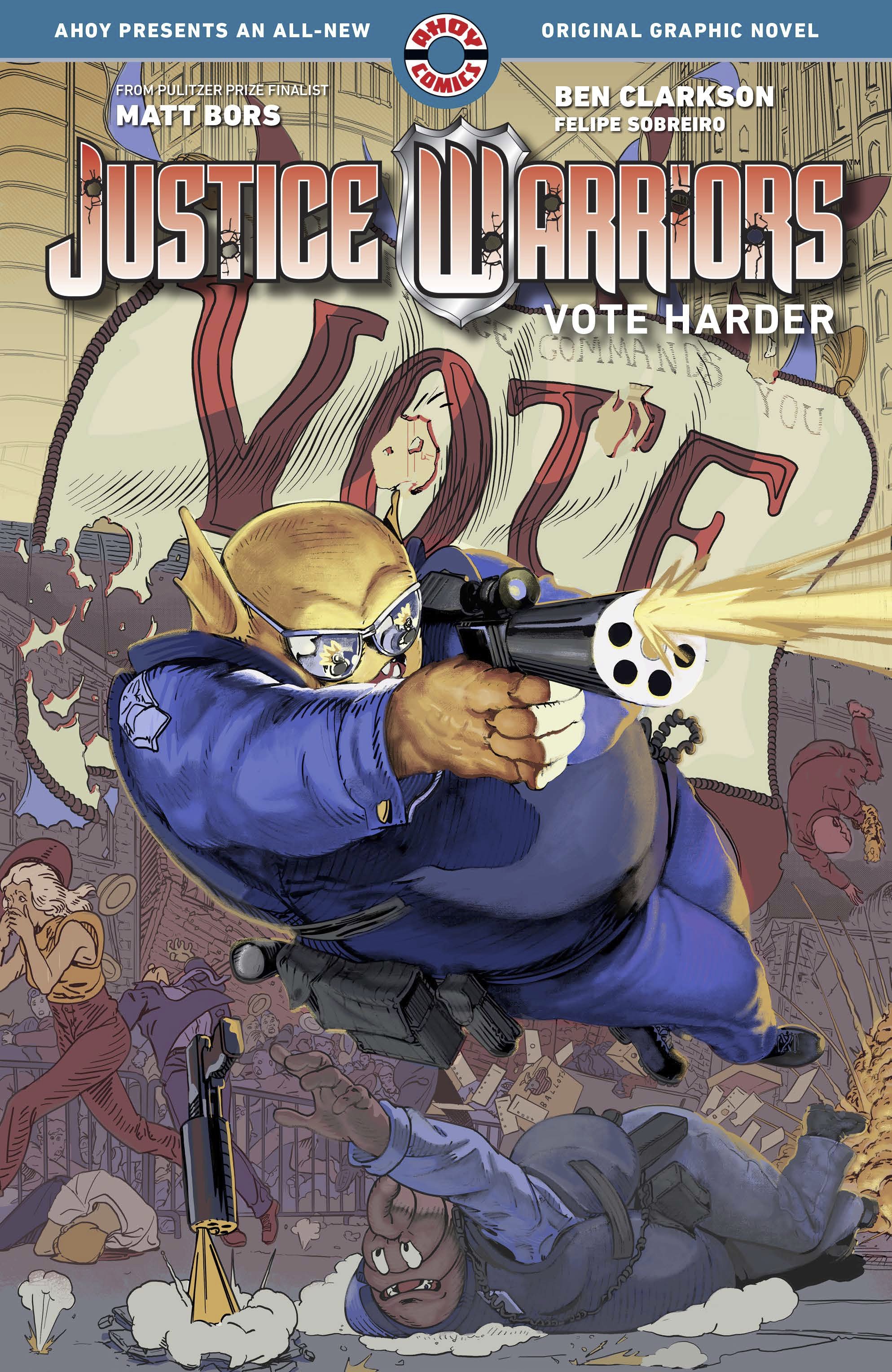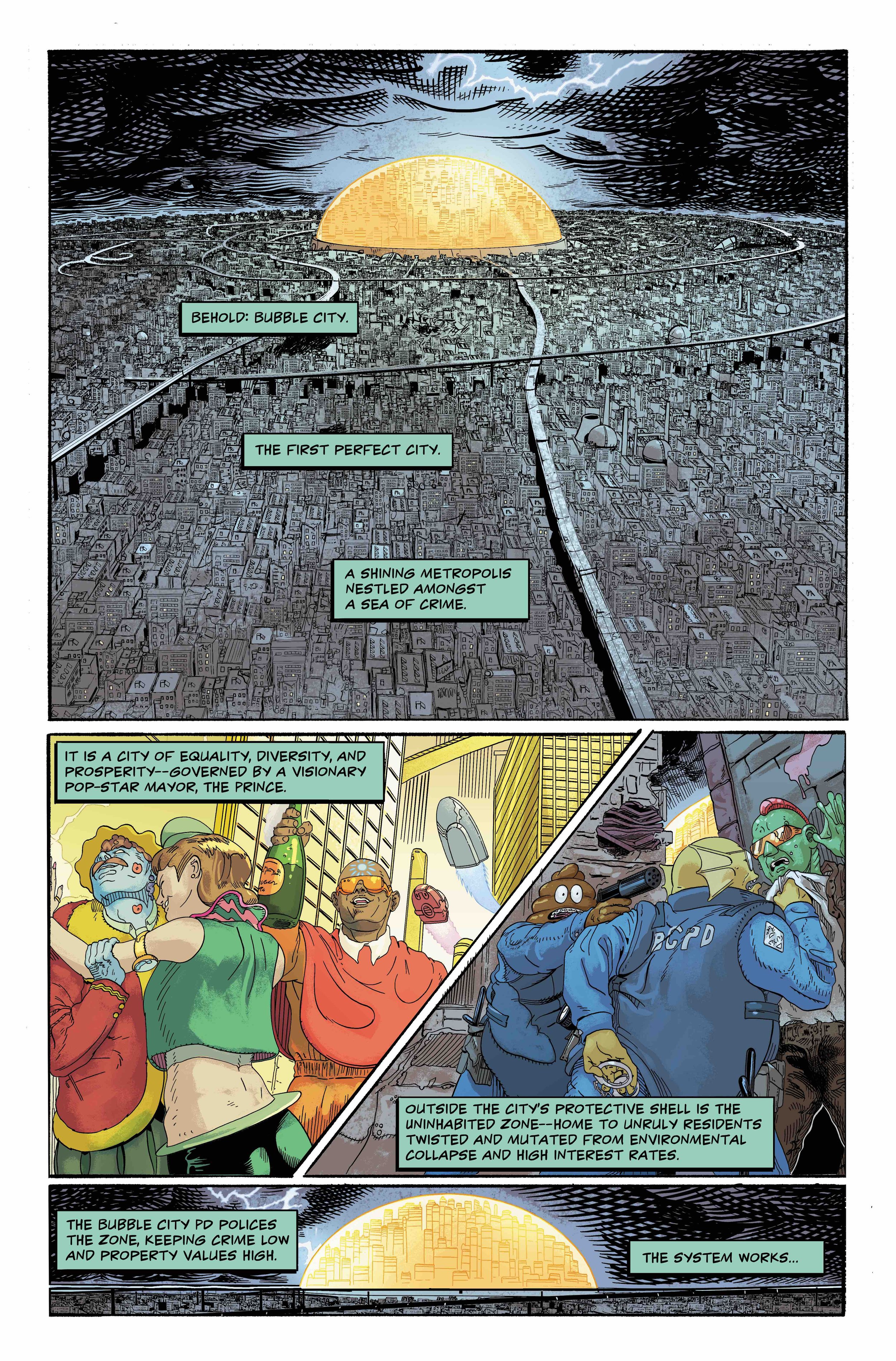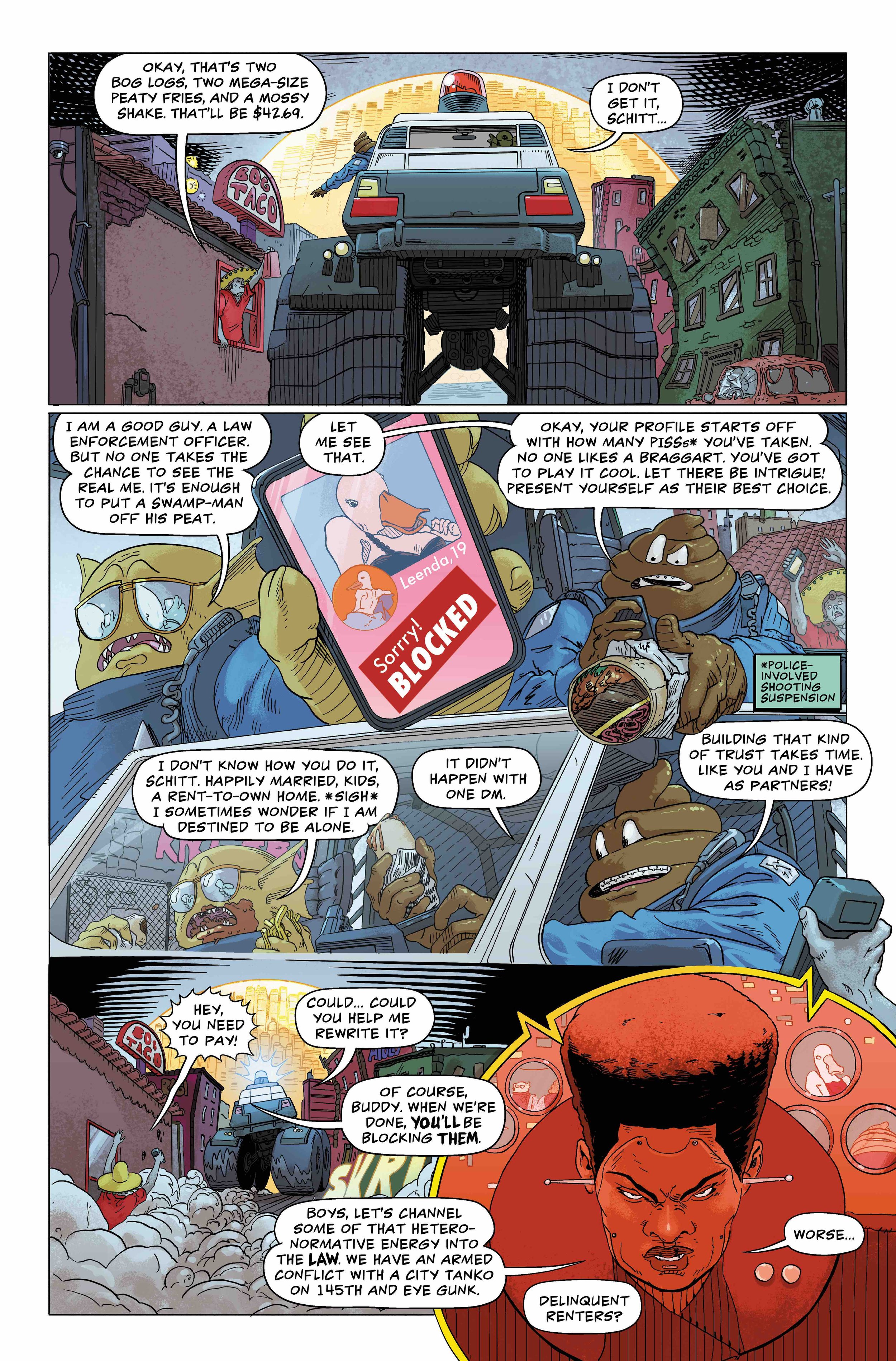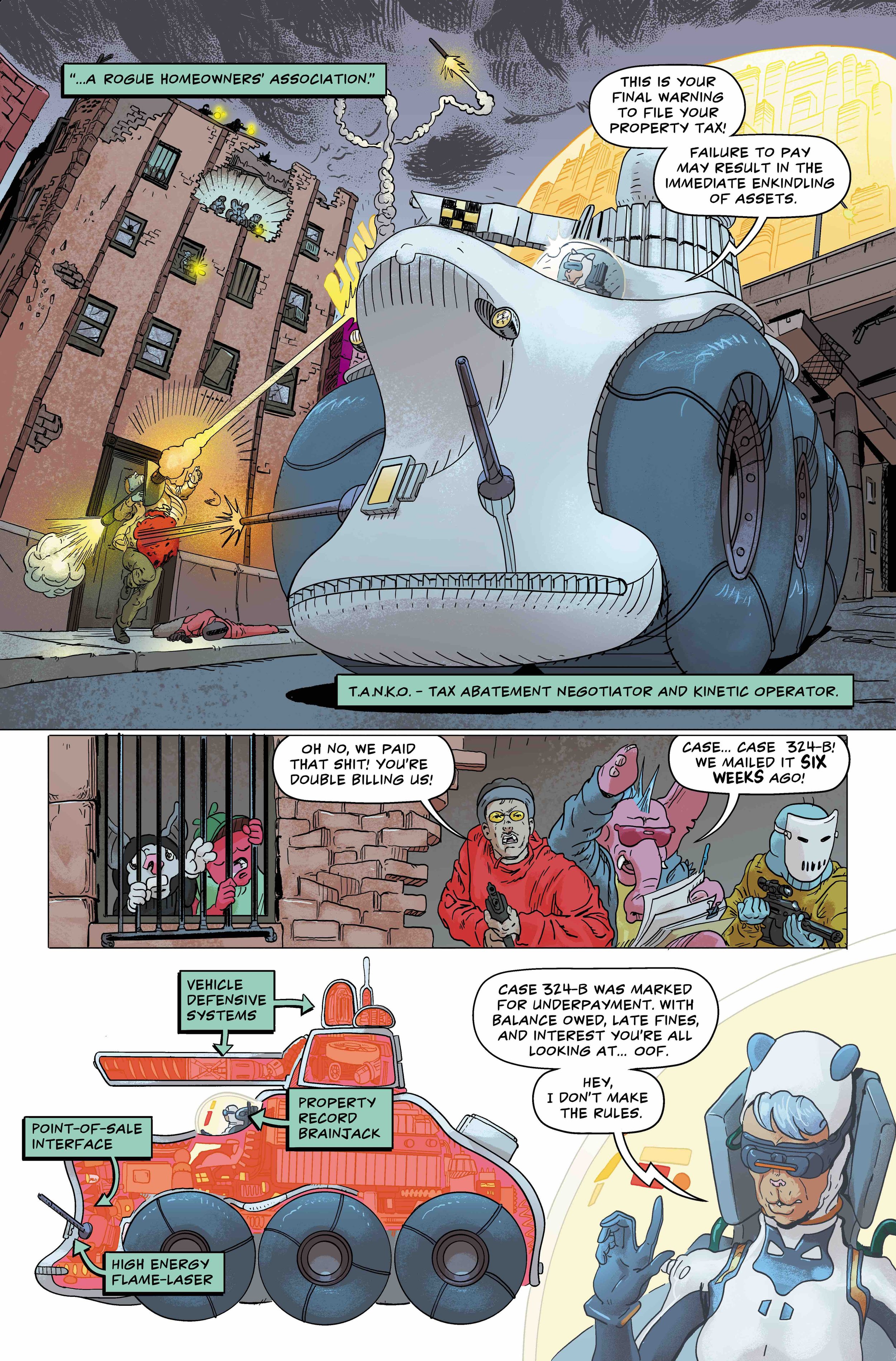JUSTICE WARRIORS, the scathing satire of capitalism and police in a future of severe inequality from Matt Bors — the founder of The Nib and a political cartoonist who has twice been named a Pulitzer Prize finalist — and Ben Clarkson — an acclaimed filmmaker and illustrator whose art has been featured on Adult Swim and Vice Noisey — is returning to shelves as a brand-new graphic novel entitled JUSTICE WARRIORS: VOTE HARDER.
“JUSTICE WARRIORS: VOTE HARDER takes the feel of paranoid political thrillers of the 70s and updates it for the online age of conspiracy, partisanship, and the desire to break out of the confines of the ballot box to do something far more radical,” said Matt Bors. “Unlikable candidates. An unfair media. And a system designed to prevent real change. It's the most important election of everyone's life—and possibly their last.”
The first JUSTICE WARRIORS series followed police officers Swamp Cop and Schitt as they patrolled the crime-free metropolis of Bubble City and its surrounding mutant-packed Uninhabited Zone. Now in VOTE HARDER, Bubble City’s first ever election for mayor pulls Officer Swamp into a violent mission that will put him on a collision course with his beloved partner Schitt. Co-written by Clarkson and Bors with art by Clarkson and backup illustrations by Bors, JUSTICE WARRIORS: VOTE HARDER features colors by Felipe Sobreiro and lettering by Bors.
"JUSTICE WARRIORS: VOTE HARDER is an epic thrillride about the infiltration of civil society by law enforcement, the corrupt bickering of unaccountable elites, and unchecked military expansion which is, of course, unrelated to the regular healthy function of our corporate oligopoly — er, democracy," said Ben Clarkson. "It's bigger, badder and more justicier than the original with a thrilling dose of orbital space lasers, giraffe assassins and obscure parliamentary procedure."
In crime-free utopia Bubble City's first-ever election for mayor, feckless celebrity incumbent The Prince faces a challenge from within the Bubble's elite: his half-cousin Stuffina Vippix IX, who promises austerity and competency. Finally a choice for the people! But out in the Uninhabited Zone, which is packed with millions of mutants, the radical and armed Flauf Tanko mounts a third-party run to inspire the masses who are fed up with the entire system. Rallying to protect the votes from the people, mutant cops Swamp and Schitt are called in on special duty. Schitt must act as bodyguard to the Prince, while his poll numbers drop and assassination attempts ramp up. Meanwhile, Swamp is sent on a clandestine mission inside the mutant opposition—to infiltrate, report, and maybe fall in love with a passionate activist triggering an identity crisis. Can the two partners survive being pitted against each other in a horserace?
“JUSTICE WARRIORS: VOTE HARDER is funny, it makes sharp points, and its artwork is so densely detailed I can only call it ‘amphetaminesque,’” said AHOY Comics Editor-in-Chief Tom Peyer. “It’s bound to cross your mind while you’re voting and it might even take some of the sting away.”
The irreverent, dark comedy JUSTICE WARRIORS was initially published by AHOY Comics as a trade paperback in 2023 and has received widespread attention from CHAPO TRAP HOUSE, IGN, POD DAMN AMERICA, CURRENT AFFAIRS, COMIC BOOK COUPLES COUNSELING, LEDGER, SUPER NICE CLUB, GRAPHIC POLICY, QANONANON, and STRUGGLE SESSION. The title went back to press for second and third printings in the wake of its popularity.
JUSTICE WARRIORS is published by AHOY Comics, the Syracuse-based independent publisher perhaps best known for SECOND COMING, a controversial satire by Mark Russell, Richard Pace and Leonard Kirk in which Jesus Christ resumes his holy mission. The company is the brainchild of journalist and satirist Hart Seely (publisher), an award-winning reporter whose humor and satire has appeared in The New York Times and on National Public Radio, comics writer Tom Peyer (editor-in-chief), and cartoonist Frank Cammuso (chief creative officer). AHOY Comics launched five years ago with four acclaimed comic book magazine titles featuring full length comic book stories, poetry, prose fiction, and cartoons.
Here's what people are saying about JUSTICE WARRIORS:
“Filled with action, humor, and biting commentary.”—SCREENRANT
“A scathing – and often quite funny – critique of modern events and norms with a heavy focus on police practices. Though its jabs are quite pointed and purposeful, its broad encompassing of topics like formula shortages and an overemphasis on social media make it seem as though nothing's off the table when it comes to being parodied.”—COMICBOOK.COM
“Matt Bors’ comic book debut is everything you hoped for from the best political cartoonist of his generation. Teamed up with visionary storyteller Ben Clarkson, JUSTICE WARRIORS gives you searing satire, at least one hilarious moment per scene and unrestrained fury at the horrors before us. Read the scene that the NYPD literally brought to life!” — Spencer Ackerman, author of REIGN OF TERROR
“A rich satirical tale of America's overconsumption and over-policing issues.”—CBR
“All the glorious dystopian satire you hoped it would be.”—BOING BOING
“This is the type of comic that comes around once in a while and reminds you what the form can achieve. Both creators deserve praise for what they’ve made here. It’s hard to believe anyone that reads comics wouldn’t enjoy this.”— AIPT Comics
“Imagine a 1980s Verhoeven scifi flick, plus Judge Dredd, plus the most ruthless social commentary imaginable. Oh, and also, it's gutbustingly hilarious. Justice Warriors scratches so very many of my itches it's unbelievable. It was my most anticipated comic of the year and it's even better than I had hoped.”—Aubrey Sitterson
“Outstanding… skewers the status quo in fun, acerbic, and earnest ways…. With this kind of sassy, surgical satire, clarity makes a cleaner cut. And man, do they make themselves clear in the best ways possible”—COMICS BEAT
"Just the perfect amount of demented!" — Bill Oakley (The Simpsons)
‘If you had your developing mind warped by Teenage Mutant Ninja Turtles, GI Joe, Robocop and comic books, and then had it further destroyed by twitter and social media, then JUSTICE WARRIORS will fill those holes in your brain. Ben Clarkson is truly goated on the inks."— Will Menaker, co-host Chapo Trap House, author of NY Times Bestseller "The Chapo Guide to Revolution"
“I’m thrilled to see Matt Bors’ work liberate itself from its 4-panel cage. Ben Clarkson's detailed art adeptly dishes the ultra-violence in this Zootopia-meets-Robocop-like satire.” — Keith Knight (K Chronicles, (th)ink, Woke)
JUSTICE WARRIORS will be on sale bookstores and comic shops everywhere on September 11, 2024.





